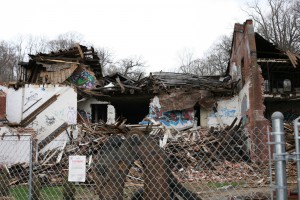Thwarted for more than a decade at redeveloping an abandoned historic factory site on the Ossining riverfront, a Pleasantville developer has mounted two legal offensives against his project opponents, claiming one defamed him in comments posted on Facebook and asking a state judge to overturn a stop-work order by Ossining village officials that has halted demolition of the former Brandreth Pill Factory.
Developer Peter Stolatis, a principal of Plateau Associates LLC, in a complaint filed last month in state Supreme Court claimed Miguel Hernandez, a longtime opponent of Plateau”™s proposed redevelopment of the 5-acre property at 36 N. Water St., defamed and libeled him in online comments on two community pages on Facebook last April.
Marc Oxman, the White Plains attorney defending Hernandez, said the defamation lawsuit seemed an attempt by Stolatis to make his client”™s opposition to the project costly in legal fees and perhaps get Hernandez to back off his public opposition
Hernandez, a former Ossining mayor and trustee and current member of the village Historic Preservation Commission, posted the comments after village building inspectors halted the developer”™s demolition of the deteriorated 19th-century factory building that is listed on the National Register of Historic Places. Officials at the time claimed the developer lacked a valid demolition permit.
Yet the village in 2008 deemed the mansard-roofed mill an unsafe structure and granted Plateau Associates a demolition permit. That came about five years before the village”™s newly formed historic preservation commission recommended the property be designated a local landmark and preserved for restoration and reuse.
Consultants for Plateau Associates, which acquired the property in foreclosure in 2001, told commission members the historic preservation work and new flood barriers on the building required after Hurricane Sandy would cost $3.2 million and exceed the property”™s value.
In a separate but related lawsuit also filed last month in state Supreme Court, Stolatis”™ attorney in White Plains, John Murtagh, cited a length history of delays, planning extensions and unreasonable and costly demands and requirements placed on the developer by village officials as Stolatis and his brother and business partner, Nicholas Stolatis, sought approvals for Hidden Cove on the Hudson, a six-story, 137-unit luxury apartment building that would replace the partially collapsed, graffiti-covered factory building. The court papers read like a developer”™s worst nightmare of biased local bureaucracy that threatens to end in “the potential bankruptcy of Plateau concerning this project and the complete failure of the project.”
Rather than improve the village”™s waterfront and housing to benefit Ossining taxpayers, Murtagh claimed in regard to village officials, “The real agenda is a spiteful use of the political process and the levers of village government to harass a developer who would not ”˜play ball”™ with petty local power-brokers.”
Those power brokers, according to Stolatis, are Hernandez and William “Bill” Burton, a development consultant and former Ossining town supervisor who advised Hernandez ”” whose home adjoins the Brandreth Pill factory site”” when Stolatis several years ago made a purchase offer to Hernandez for his property. Burton at the time served as a Westchester County legislator and was chairman of the Ossining Democratic Committee.
Stolatis and his attorney claimed Burton attempted to “shake down” the developer and renegotiate the price of the Hernandez property to four times its fair market value. Burton said he was “politically connected” and could help Plateau obtain project approvals for a $50,000 fee, according to the plaintiff. The developer said he declined the offer.
Stolatis in both lawsuits claimed Plateau”™s refusal to make the deal with Hernandez and Burton has resulted in the ongoing delays and attempts to defeat the Hidden Cove project by the two men”™s “political and governmental associates.”
Stolatis also claimed that Hernandez and others “engineered” the creation of the historic preservation commission and Hernandez”™ appointment to it. Hernandez especially pushed to have the Brandreth factory designated a landmark, according to court papers, and village trustees adopted the commission”™s recommendation.
“Thus, the village had, inexplicably, reversed itself entirely ”” moving from approved demolition of an unsafe structure to an oppressive, burdensome and groundless ”˜ex-post facto”™ landmarking,” Murtagh wrote in the court petition.
Plateau Associates wants a state judge to order Ossining officials to lift the 5-month-old stop-work order for the demolition project.
In the separate legal action against Hernandez, the attorney for Stolatis claimed the developer”™s reputation was harmed by false statements made by Hernandez on two public Facebook pages, “About Ossining ”” A Town Square,” and “Ossining Taxpayers.”
A frequent commentator on the sites, Hernandez posted a photograph of Stolatis taken at the Brandreth Pill Factory and captioned it, “Peter Stolatis at the site of his crime.” He later posted what he labeled “additional photos of the crime scene” and described the demolition contracting company as “unwitting accessories to the crime.”
In another posting, Hernandez claimed Stolatis had removed part of a metal roof on the factory and punched holes in it, calling the developer”™s action “demolition by intentional neglect.”
The developer”™s attorney argued those statements were defamatory and libelous by asserting that Stolatis was a criminal and had engaged in criminal activities, and Hernandez knew the false statements would damage the developer”™s personal and business reputation.
“It”™s not even close” to constituting defamation or libel, Oxman said of his client”™s online statements. “There is no legal basis to the defamation action, and I am confident that it will be dismissed.”
Oxman said he thought the lawsuit “has been brought for the sole purpose of discouraging or chilling Mr. Hernandez from his opposition to Stolatis”™ development plans.” He said he might counter with a legal action based on a New York civil rights statute that protects defendants from SLAPPs, or Strategic Lawsuits Against Public Participation.





















